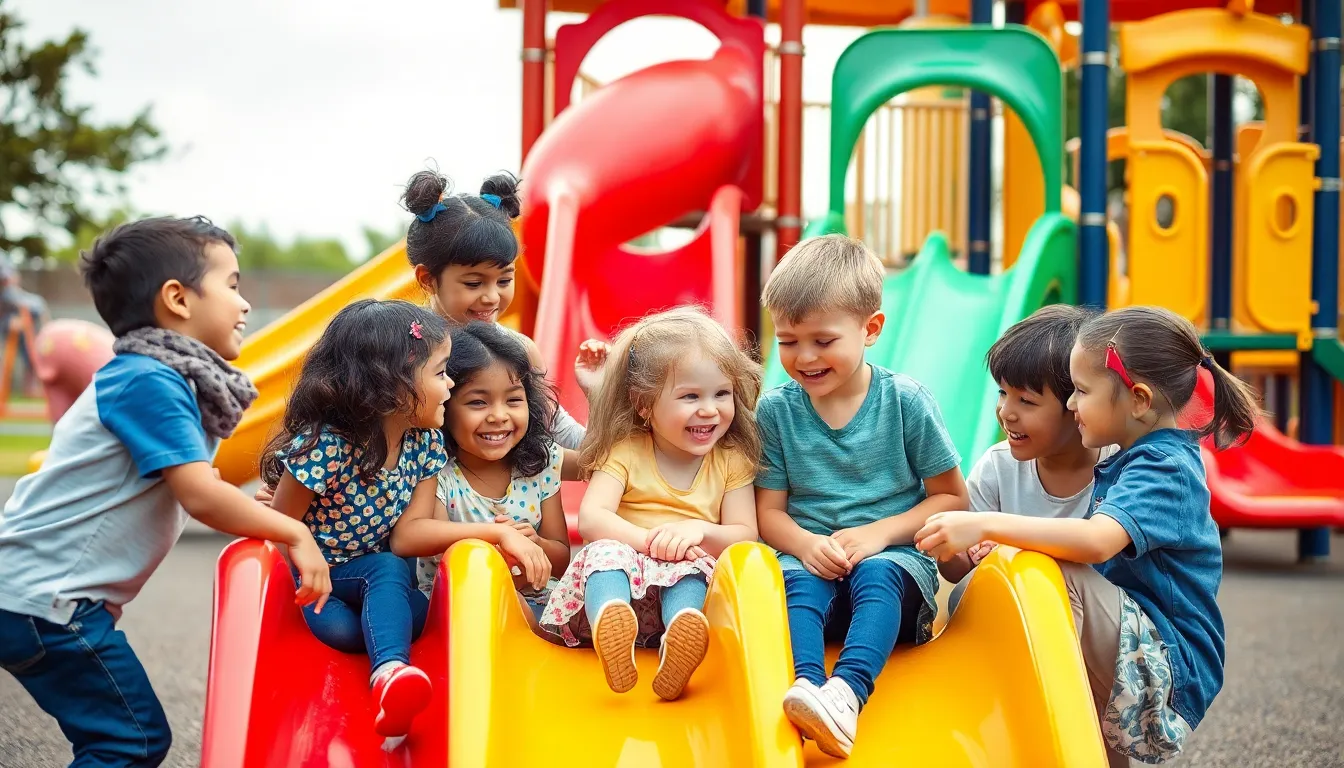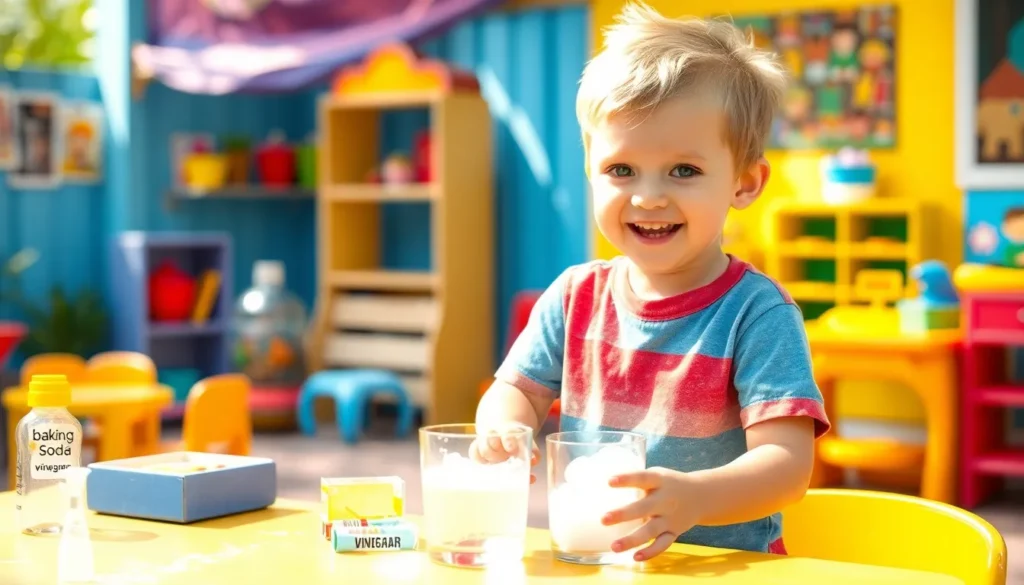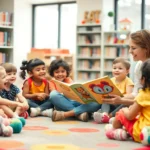Table of Contents
ToggleImagine a world where learning feels less like a chore and more like an epic adventure. Welcome to the realm of learning through play, where kids discover new skills while unleashing their inner superheroes. It’s not just about building blocks and crayons; it’s about crafting a foundation for lifelong curiosity and creativity.
In this magical space, children don’t just memorize facts—they engage, explore, and experiment. From playful problem-solving to imaginative storytelling, every game lays the groundwork for critical thinking and collaboration. So, why not trade in those dull textbooks for a treasure chest of fun? After all, who wouldn’t want to learn while pretending to be a pirate or a dinosaur? Dive into the delightful world of learning through play and watch as the joy of discovery transforms education into an unforgettable journey.
Overview of Learning Through Play
Learning through play encompasses various methods that engage children in their education. This approach utilizes hands-on experiences that promote creativity and imagination. Through playful activities, children can develop vital skills like problem-solving and collaboration. By facilitating exploration and experimentation, this method fosters a deep understanding of concepts.
Research indicates that play is essential in a child’s cognitive development. It enhances memory retention while making the learning process enjoyable. Incorporating play-based strategies within educational settings creates a dynamic atmosphere. Children thrive in environments that encourage curiosity.
Examples of learning through play include interactive games, role-playing, and hands-on experiments. Each activity targets specific learning objectives while allowing children to express themselves freely. Play serves as a natural motivator, inspiring kids to delve deeper into subjects.
Teachers benefit from this approach as well, adapting their lesson plans to integrate playful elements. Adjusting traditional curriculums increases engagement and retention among students. Learning through play cultivates a growth mindset, encouraging resilience when faced with challenges.
Overall, embracing this educational philosophy leads to well-rounded development. Children emerge from these experiences not only with knowledge but also with confidence and social skills. Educational systems that prioritize playful learning lay the foundation for lifelong learners.
Benefits of Learning Through Play

Learning through play offers numerous benefits that significantly enhance education for children. This approach nurtures both cognitive and social development, equipping kids with essential skills for life.
Cognitive Development
Cognitive skills improve dramatically when children engage in play-based learning. Research shows that active participation in playful activities boosts memory retention and critical thinking. Children encounter challenges during play, encouraging them to problem-solve effectively. Through interactive games and hands-on experiments, kids develop a better understanding of concepts. Fostering creativity also plays a crucial role, as imaginative thinking emerges during playtime. Engaging in role-playing scenarios enhances their ability to visualize outcomes and make connections. Ultimately, play stimulates curiosity, fostering a love for learning that lasts a lifetime.
Social Skills Enhancement
Social skills flourish in environments that prioritize play. Interaction with peers during play teaches essential skills like communication and cooperation. Children learn to share, negotiate, and resolve conflicts through playful activities. Collaborating on projects fosters teamwork, reinforcing the value of diverse perspectives. Additionally, engaging in role play encourages empathy, allowing kids to understand different viewpoints. As children navigate social situations, they develop confidence and build friendships. Experiencing both successes and challenges during play helps them understand social dynamics. These skills lay the groundwork for strong relationships throughout their lives.
Key Theories Supporting Learning Through Play
Learning through play is backed by several influential theories that elaborate on how children develop through playful activities.
Piaget’s Theory of Play
Piaget’s theory emphasizes the importance of play in cognitive development. He classified play into distinct stages, highlighting how children actively construct knowledge. Through imaginative play, children engage in symbol use and explore their environment. Activities like role-playing facilitate problem-solving skills, as kids experiment with various scenarios. Both interaction and manipulation of objects promote logical thinking during these stages. Cognitive development benefits significantly from these hands-on experiences that accompany play.
Vygotsky’s Sociocultural Theory
Vygotsky’s sociocultural theory underscores the role of social interaction in learning. He posited that play serves as a critical medium for cognitive growth. Social play helps children internalize cultural norms and values, shaping their understanding of the world. Children learn through collaboration and dialogue, negotiating roles and rules in their play. This collaborative aspect boosts language development and critical thinking. Play offers a rich context for children to engage with peers, facilitating social skills while navigating shared experiences.
Practical Strategies for Implementing Learning Through Play
Incorporating learning through play requires specific strategies that enhance children’s educational experiences. First, prioritize hands-on activities that align with core learning objectives. Use interactive games, role-playing, and experiments that stimulate curiosity. Teachers can facilitate inquiry-based projects where students explore topics in-depth while having fun.
Second, create a playful environment. Arrange learning spaces that encourage movement and creativity. Adequate resources such as building blocks, art supplies, and science kits inspire exploration. Classrooms should adapt to promote collaborative play, allowing children to engage in teamwork and communication.
Third, integrate storytelling into lessons. Story-based activities spark imagination and help students connect with learning materials. Encourage children to create their own stories or reimagine existing narratives. This not only strengthens literacy skills but also fosters critical thinking.
Next, involve families in the learning process. Host family game nights or workshops that emphasize play-based learning at home. This collaboration extends learning beyond the classroom, reinforcing concepts and encouraging parents to participate actively.
Finally, regularly assess understanding through playful evaluations. Use quizzes disguised as games or group challenges to gauge student progress. Such assessments maintain engagement while providing teachers valuable insights into learning outcomes.
By implementing these strategies, educators promote a dynamic and effective educational experience that aligns with the principles of learning through play. Each approach ensures that children not only learn but also develop essential skills in a joyful setting.
Challenges and Considerations
Implementing learning through play presents various challenges. Educators often encounter limitations such as inadequate resources and time restrictions. Teachers typically face curriculum requirements that may prioritize traditional methods over play-based strategies. Integrating playful elements requires thoughtful planning and alignment with educational standards.
Classroom management poses another consideration. Maintaining structure within a playful environment can be difficult, especially with younger children. Balancing freedom and guidance is crucial for ensuring effective learning occurs during play. Additionally, assessing learning through play can complicate evaluation processes, as conventional tests may not capture individual progress.
Moreover, misconceptions about play need addressing. Some educators and parents view play merely as unstructured leisure rather than a valuable learning tool. Educators should communicate the educational benefits of play to foster greater acceptance among stakeholders. Promoting successful examples can help illustrate the effectiveness of play-based approaches.
Cost can also be a concern. Schools may struggle to fund materials and training needed for effective play-based learning. Investing in professional development for educators enhances their ability to implement strategies successfully. Demonstrating long-term benefits through enhanced student engagement may justify initial expenditures.
Cultural factors must also be considered. Different educational backgrounds influence perceptions of play in learning. Educational leaders should create inclusive strategies that acknowledge and embrace diverse viewpoints on learning through play. Engaging families in conversations about play fosters an environment where community values enrich the educational experience.
Adapting to these challenges while maintaining a focus on learning through play creates a dynamic educational landscape. Embracing these considerations optimizes the approach, leading to enhanced development among children.
Learning through play is a powerful approach that transforms education into an engaging and dynamic experience. By prioritizing play, children not only grasp essential concepts but also develop critical life skills such as creativity, collaboration, and resilience. This method encourages exploration and curiosity, making learning enjoyable and memorable.
As educators embrace the principles of play-based learning, they create environments where children thrive academically and socially. The challenges of implementing this approach can be overcome with thoughtful strategies and a commitment to fostering an inclusive atmosphere. Ultimately, prioritizing play in education equips children with the tools they need to become lifelong learners, ready to navigate the complexities of the world around them.





